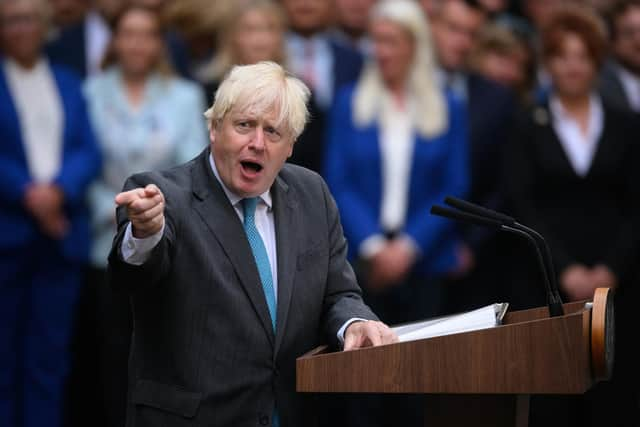The Covid Inquiry and WhatsApp saga highlights a change in Westminster - David Blunkett
These machinations are matched by the Government’s wish to vet the WhatsApp messages and other sources of records from the time – including what other information Boris Johnson actually holds on his mobile phones.
I ought to declare an interest. I know Baroness Heather Hallett, who is the senior retired judge overseeing the Inquiry, and I like and trust her. I served with her on the House of Lords Justice and Home Affairs Select Committee, which she stepped down from as a representative of the Crossbench Peers when she agreed to take on the daunting task of investigating the handling of Covid in the UK.
Advertisement
Hide AdAdvertisement
Hide AdBut I think her task has been made more difficult by the lack of clarity as to exactly what the intended outcome of the final report is to be. I don’t mean what the present Government would wish to see as an outcome, but rather what is it they are trying to interrogate, and what do we really want to learn?


I think back to my eight years in Cabinet when there were no texts, no WhatsApp messages and, thankfully, a great deal of person-to-person discussion. What became official, was recorded as being official exchanges. In fact, one of the quirks of Government was to find that the correspondence you were signing off between ministers and/or to the Prime Minister, had already been checked by those working in the Private Office of the person who was the recipient of your correspondence.
Yes, the Mandarins have a network of their own, and you have to be aware of it in order to sometimes circumvent it. I wrote my own letters to Tony Blair and Gordon Brown, and had the issue raised with me by the then-Permanent Secretary to the Cabinet, who was clearly aggrieved that “your civil servants” had not been involved in drafting the communication. What he really meant was that the network within the civil service were not alerted, had not been involved in the drafting and felt that, in some way, they were “out of the loop”.
Of course, WhatsApp messaging superseded all of that! In doing so, the Ministers and others not only circumvented official channels, but reduced really difficult and challenging issues to what could be sent immediately by this electronic method of interacting.
Advertisement
Hide AdAdvertisement
Hide AdConversation leading to conclusion was now secondary to instant messaging without the nuance or the intelligent dialogue which face-to-face interaction allows us to deliver.
In my day, conversations over the official telephone system were also monitored by the Private Office, and a note taken.
This was an era when mobile phones were available and had already started to make such practices an anachronism. But quite rightly, we were horrified in 2011 to have confirmed what had been rumoured over previous years: that answerphone messages had been hacked, and in some cases actual conversations had been intercepted by what’s known as “triangulation”. This is where transmitters are identified and can be used to determine where the phone is being used, and therefore how to intercept.
So, we get into a situation with the WhatsApp records where distinguishing what was relevant to public office, and what was genuinely private, becomes a nightmare to disentangle.
Advertisement
Hide AdAdvertisement
Hide AdIf Government, and read for that “officials”, want to “vet” what goes to the Inquiry, and the Inquiry want to do the “vetting” themselves, you end up with a farcical situation of Judicial Review, and yet another judge determining what the Chair of the Inquiry (herself a judge), should or should not be allowed to see. Complicated again by the fact that it will be those officials working for her who will be doing the sifting of what must be an unprecedented volume of communications.
To add to this complex minefield, it is also worth recalling that Matt Hancock, sometime health secretary during Covid, released his WhatsApp messages to a journalist, presumably in the belief that he might get his side of the story in first. That didn’t go well either.
From outside this tangled web and trying to understand what is behind some of the “games” that are being played, there might seem to be a third option. Namely, that an agreed third-party (yes, I am afraid another unit), which is neither government nor responsible to the Inquiry, do the sifting.
What is private and irrelevant to getting to the truth could remain private, whilst of course allowing relevant official interchanges to be disclosed for both the immediate task and for the record.
Advertisement
Hide AdAdvertisement
Hide AdAs someone – thanks to the University of Sheffield and the National Archive – who values the store of documentation and correspondence from my own time in public life (held in the Blunkett Archive), I want us to be able to retain and learn from our recent history. How else do we understand the workings of government in our democracy, or for that matter, learn from and avoid the mistakes of the past?
That surely should be uppermost in the minds of those engaged in what to most people must seem to be a bizarre and irrelevant wrestling match.
David Blunkett is a Labour Party politician, and served as the MP for Sheffield Brightside and Hillsborough.